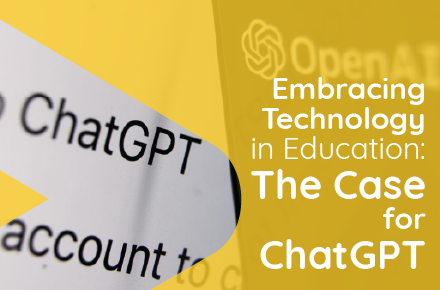Empowering Education: Schools Embrace ChatGPT to Ensure Student Success

Empowering Education: Schools Embrace ChatGPT to Ensure Student Success
In an era dominated by rapid technological advancements, education is evolving at an unprecedented pace. As the world continues to embrace artificial intelligence (AI) and its applications, schools are stepping up to the plate, integrating innovative AI models like ChatGPT into their curricula. This shift aims not only to keep students from being left behind in an increasingly digital society but also to equip them with the skills and knowledge needed to thrive in the 21st century.
Rising to the Challenge
Traditional education models, while still valuable, face the challenge of preparing students for a world where AI, machine learning, and automation are becoming commonplace. As industries transform and job landscapes shift, it has become imperative for educational institutions to adapt their strategies to align with these changes. This has given rise to the integration of AI-based tools like ChatGPT in classrooms, ensuring that students gain exposure to and proficiency in cutting-edge technologies.
The Power of ChatGPT in Education
ChatGPT, a state-of-the-art AI language model developed by OpenAI, holds significant promise for education. It functions as a language generator, capable of producing coherent and contextually relevant text in response to prompts. This ability to generate human-like text opens the door to a multitude of educational applications, from aiding in homework assignments to promoting critical thinking and creative writing skills.

Incorporating ChatGPT into schools’ educational strategies offers numerous benefits. One of the most prominent advantages is its versatility. ChatGPT can serve as a virtual tutor, answering students’ questions and providing explanations on a wide range of subjects. This instant access to information encourages independent learning and problem-solving, fostering a sense of curiosity that is essential for lifelong learning.
Fostering Creativity and Critical Thinking
Education is not merely about accumulating facts; it’s about cultivating creativity and critical thinking. ChatGPT can play a pivotal role in this aspect by encouraging students to think outside the box. When given open-ended prompts, ChatGPT can generate creative responses that challenge students to analyze, evaluate, and expand upon the ideas presented. This process nurtures cognitive flexibility and enhances the students’ ability to approach problems from various angles.
Furthermore, ChatGPT can serve as a writing companion, offering suggestions and feedback on essays and assignments. By analyzing the context and content of a student’s writing, ChatGPT can provide insights into grammar, style, and coherence. This assists students in refining their writing skills and effectively conveying their thoughts—a crucial competency in both academic and professional settings.

Promoting Inclusivity and Accessibility
One of the remarkable advantages of integrating ChatGPT into education is its potential to level the playing field for students with diverse learning needs. In a traditional classroom, educators often face challenges in addressing the individualized requirements of each student. However, with ChatGPT’s adaptability, students can receive personalized support tailored to their learning pace and preferences.
For students with disabilities, ChatGPT can be a game changer. It can provide auditory explanations for visual content, making educational materials more accessible. Similarly, students who struggle with reading can benefit from text-to-speech functionalities, ensuring that they grasp the content effectively. This inclusivity fosters an environment where every student, regardless of their learning style or abilities, has the opportunity to excel.
Nurturing Digital Literacy
Incorporating ChatGPT into the classroom not only imparts subject-specific knowledge but also cultivates digital literacy—an essential skill in today’s technology-driven world. Students interact with AI-driven tools on a regular basis, from virtual assistants to recommendation algorithms. Familiarity with AI models like ChatGPT equips students with the ability to navigate, understand, and critically evaluate the AI-generated information they encounter.
Teaching students how AI models work, their capabilities, and their limitations empowers them to be discerning consumers of AI-generated content. They can distinguish between reliable information and biased or inaccurate outputs, thereby becoming more informed and responsible digital citizens.
Addressing Ethical Considerations
As schools integrate AI tools like ChatGPT into education, addressing ethical considerations becomes paramount. Educators play a pivotal role in guiding students’ interactions with AI models, emphasizing the importance of using AI responsibly and ethically. Discussions around data privacy, bias in AI algorithms, and the implications of relying solely on AI-generated content are essential components of an AI-integrated curriculum.

Looking Ahead
The integration of ChatGPT and similar AI models into education marks a significant step toward future-proofing students. As technology continues to reshape industries and societies, the skills that students require are evolving. By equipping them with AI literacy, critical thinking abilities, and problem-solving skills, schools are preparing students not only for the challenges of tomorrow but also for the opportunities that lie ahead.
While AI will never replace the role of educators, it serves as a powerful ally in enhancing the learning experience. The synergy between human instruction and AI support creates an environment where students can thrive academically and personally. As educational institutions continue to innovate and adapt, they demonstrate their commitment to nurturing well-rounded individuals who are ready to contribute positively to the world.
In the end, the journey toward AI-integrated education is not about replacing tradition but about embracing progress to create a holistic and effective learning ecosystem. By leveraging the potential of AI models like ChatGPT, schools are ensuring that no student is left behind in the dynamic landscape of the 21st century.




